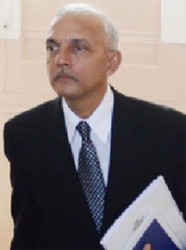APNU Member of Parliament Ronald Bulkan has accused the government of victimising regions controlled by the opposition, since its proposed budget makes larger provisions for the Regional Democratic Councils (RDCs) controlled by the PPP/C than those controlled by either APNU or AFC.
Bulkan, the APNU point person on local government, made this statement in the National Assembly on Tuesday during his contribution in the debate on the government’s proposed $208.8B budget.
“I can point out that the two highest allocations are to Region 6 and Region 2, at $383 million and $367 million, respectively, for two regions controlled by the PPP/C,” he said. “The regions receiving the two lowest allocations are regions 8 and 7, with $151 million and $134 million, respectively… both being opposition-dominated regions,” Bulkan added.
He further noted that in the case of Region 4, which has the largest population by far, its proposed allocation is less than all the regions with the exception of regions 7 and 8. “…The [signal] is unmistakable, which is Central Government will exercise its steel heel on the opposition-controlled RDCs, perhaps in the expectation that voters in these regions will someday see the error of their ways and switch allegiance to the PPP/C. It is not going to happen…” he declared.

According to Bulkan, a total of $22.5 billion is allocated to the regional administrations and he said this is made up of $19.5 billion for current expenditure and $2.601 billion for capital expenditure. Government’s aim with the miniscule allocation for capital works is to minimise the scope of regional governments and secondly to increase the profile of the Central Government to make it the sole centre of authority and where all have to look towards for access to state resources, he contended.
He called on the government to engage local democratic organs as mandated by the Constitution and to see that projects in the regions are not the sole responsibility of “a handful of unelected ministry officials.”
“Mr. Speaker, Budget 2013 suffers from the same terminal defects as budget 2012, which is that it arose out of an illegitimate process given that the majority of the legislature was shut out of the process. This budget deserves to be declared DOA [Dead on Arrival]. I do not commend it to this House,” he added.
Bulkan said that the fashioning of a plan for the country cannot be done without consulting with the ten regional administrations, which the government has failed to do. He said that government not only has a moral obligation to consult with the regional administrations but also constitutional duty to do so. “The Minister [of Finance] in his presentation made no mention of any such consultations or engagements nor did he even allude to any such exercise,” he said.
The government should not boast of the size of the budget, Bulkan said, but of the effectiveness of the provisions and allocations contained in it. He wanted to know what the proposed expenditure will do to improve the economy, create jobs, raise living standards, address the structural imbalance of the economy, improve access to and the level of education and health services, public safety and public security, reverse the deteriorating state of basic physical and economic infrastructure, and address the spiraling cost of living and the plight of the poor and the vulnerable.
He said that the government facilitates cronyism, corruption and incompetence and that political loyalty trumps merit. One can expect more of the same with this new budget, he suggested.
“We are told that a few so called flagship projects, namely the Marriott Hotel, the expansion of the Cheddi Jagan International Airport, and the Amaila Falls hydro project, are going to solve the structural imbalances of our economy. These projects were not subject to independent technical appraisal,” he said. “I would have thought that the fiasco of the Skeldon Sugar factory would have been of salutary value, but [this was not the case],” he added.
Given reports in the press about Government’s solar electrification project in hinterland communities, Bulkan also said that APNU will be calling for an audit of this project and of the 10,601 recipients to learn of its usefulness, efficacy, and cost-effectiveness. He said that seeking to place hinterland communities on a sustainable path has to be a priority for the government.




